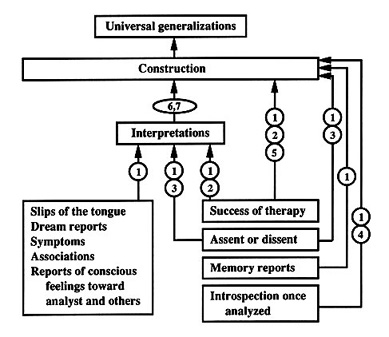Problem 4: Nisbett and Wilson Findings
Freud claims that patients' veridical insight causes a durable cure of psychoneurosis. Thus, the epistemic reliability of patients' intropections is of utmost importance. However, cognitive psychologists Nisbett and Wilson (1977) have shown that just like outside observers, subjects have only inferential, rather than privileged, access to the causal linkages that actually connect their mental states.
The figure below (Von Eckardt, 1986) represents epistemological problems in Freud's use of clinical data as discussed by Grünbaum (1984) (circled numbers correspond to numbered problems at left; arrows represent the relation "is considered evidence for").

LEVELS
PROBLEMS
- suggestibility (pp. 130-135);
- failure of tally argument (pp. 135-172);
- weakness of consilience argument (pp. 273-278);
- Nisbett and Wilson findings (pp. 147-148);
- problems with Breuer-Freud argument (pp. 177-189);
- problems with extrapolation to slips and dreams (pp. 190-239);
- problems with establishing causal claims by retrospective testing (pp. 177-189).
References
Grünbaum, A. (1984). The foundations of psychoanalysis: A philosophical critique. Berkeley, CA: University of California Press.
Nisbett, R., & Wilson, T. (1977). Telling more than we can know: Verbal reports on mental processes. Psychological Review, 84, 231-259.
Von Eckardt, B. (1986). Grünbaum's challenge to Freud's logic of argumentation: A reconstruction and an addendum. The Behavioral and Brain Sciences, 9, 262-263.
Last modified January 1999
Visited times since July 2001
Comments?
Home to Psychoanalysis
Home to Great Ideas in Personality
